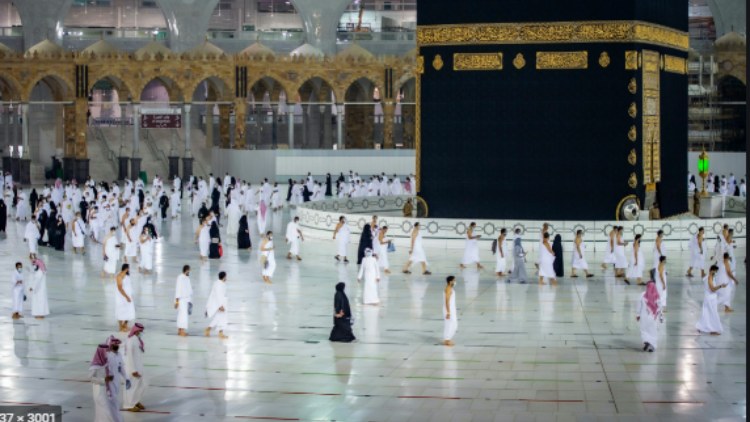
 Obaidur Rahman Nadwi
Obaidur Rahman Nadwi
Hajj is the culminating tenet of Islam. “The word Hajj means, literally, repairing to a place for the sake of visit (al-qasd liziyarah), and in the terminology of the Islamic Shariah, it implies repairing to BaitAllah (the House of Allah) to observe the necessary devotions (iqamatanli-nusuk) in the sacred places in the Holy Makkah.” (Sirat-un-Nabivol-5 page-117)
Hajj is such a worship by which one exhibits one’s servitude and slavery and shows humility, meekness, and condescension before a philanthropist. It should be kept in mind that Hajj surpasses in merits and excellences as compared to other tenets of Islam. For sacrifice of body and sacrifice of wealth both are required in the trip of Hajj. Apart from it pilgrims (Hajis) get absorbed in prayer and worship till they return home from this auspicious journey. Hajj is obligatory for Muslims once in their life-time, provided one can afford it.
The Holy Quran says: “Pilgrimage to the House (of Allah) is a duty men owe to God those who can afford the journey” (111:97) Abdullah Bin Umar narrates that a person came to the Apostle of Allah and asked: “What makes the Hajj obligatory?” “the wherewithal of Journey and the conveyance” replied the prophet. Hence if one does not perform Hajj despite one’s means, is not a true Muslim but an imposter.
It is related by Caliph Ali that the Apostle of Allah said: “Anyone whom Allah has given enough to perform the Hajj, and he, also, has a conveyance which can take him to the House of Allah, if he still fails to do so then it does not matter, whether he dies a Jew or a Christian and it is so because Allah has said: “Pilgrimage to the House (of Allah) is a duty men owe to God those who can afford the journey” (Tirmizi).
Needless to add that the process of undertaking Hajj is a exercise in devotion. It is celebrated in commemoration of the sacrifice of Hazrat Ibrahim and Hazrat Ismail. One may guess from the trip of Hajj that what does Almighty Allah ask from us? It tells us the importance and significance of obedience and submission. Allah was so pleased with the deeds and doings of Hazrat Ibrahim and Hazrat Ismail that it was made obligatory for Muslims to remember the sacrifice by including it in the five fundamental tenets of Islam.
In Hajj, pilgrims exhibit complete submission and dedication to their Creator and Sustainer. After wearing Ihram (the unstitched towels wrapped round the body during Hajj) they surrender themselves on the threshold of Allah reciting the Talbia “Allahumma labbaik; labbaik laa shreeka Laka Labbaik; innal-hamda wan nai mata Lak wal mulk; Laa shareek Lak. (O God! here I am in Thy presence! Thou hast no partner! all praise is for Thee and from Thee are all blessings! To Thee alone belongs Power and Rule! Thou’ art without a partner!)
Late Maulana S.Abul Hasan Ali Nadwi says:
The most fascinating feature of the Haj is the spirit of enchantment, devotion and selfeffacement which pervades the entire pilgrimage, from the beginning to the end. In it the governance of the mind is entrusted to the heart and the glorious example of the earnest men of God and His genuine adores, and their forerunner, Hazrat Ibrahim, the Friend of Allah, is followed in every act and observance.
Sometimes the pilgrim walks zealously round the House of Ka’aba, sometimes he kisses the Black Stone and sometimes he portrays the intensity of mother’s love at Safa and Marwa by running where Hazrat Hajira, the mother of Hazrat Ismail, had run and walking with poise and dignity where she had walked in that way. Thereafter, he is bidden to leave for Mina on the 8th day of Zil-Hijja, and, then, to stay in the valley of Arafat and devote himself earnestly to prayer and supplication. The night is spent at Muzdalifa and, for no other reason than to emulate the example of Hazrat Ibrahim and the Prophet.“
He further says: “The most striking part, however, of this unique display of love, imitation and emulation is the rite of Rami Jemar which is simply the simulation of an act performed by Hazrat Ibrahim. There is a force in following the example of the devout servants of the Lord which is catching. The inner radiance of these glorious specimens of faith, their matchless spirit of love and dedication is transmitted to those who strive to follow in their footsteps like an electric current. It is the best and most effective way to attract the Mercy of Lord.
No spectacle is more enthralling for those who have experienced this feeling than the getting together of ardent adorers and faithful bondmen on that blessed land for re-enacting the magnificent episode and recreating the sublime events that had taken place thousands of years ago but have been eternalised by God and endowed with His gracious acceptance. It has been decreed by His that His loyal and truthful servants, from all over the world, will re-enact the whole series of events in the same way and in the spirit of defeating and disgracing the Devil, fortifying the faith and emulating the soul stirring example of Hazrat Ibrahim.”(The Four Pillars of Islam: p,235-236)
It should be borne in mind that the Hajj fosters unity, integrity, brotherhood, fraternity and equality. “Down to the ages” says professor Hitti “this institution has continued to serve as the major unifying influence in Islam and the most effective common bond among the diverse believers. It renders almost every capable Muslim perforce a traveller for once in his life time. The socializing influence of such a gathering of the brotherhood of believers from the far quarters of the earth is hard to overestimate. It afforded opportunity for Negroes, Berbers, Chinese, Persians, Syrians, Turks, rich and poor, high and low to fraternize and meet together on the common ground of faith” (History of the Arabs p. 136)
We further comprehend the significance and importance of the Hajj through the Harvard Study. A study of Hajj pilgrims by Harvard Kennedy School in the US has found that the Hajj promotes tolerance among pilgrims and does not lead to an increase in negative attitude toward the west. The study entitled “Estimating the Impact of the Hajj; Religion and Tolerance in Islam’s Global Gathering” said that the annual pilgrimage develops a tolerant attitude among pilgrims toward other religions and cultures. Evidence suggests that the Hajj increases tolerance, which seems to apply not just within the Islamic world but also beyond it” adding that increase of unity does not lead to antipathy toward no-Muslims.
Moreover the Hajj makes the pilgrims pure, sinless and spotless. The holy prophet says: “Whoever performs the Hajj and commits no lustful act during it not disobeys God (in any other way) shall return from it as pure and sinless as he was at the time of his birth” It is related by Abdullah bin Masud that the Apostle of Allah said: “Perform the Hajj and Umra again and again for both, the Hajj and Umra, remove Poverty and sins in the same way as the furnace removes the impurities of gold, silver, and iron and there is no lesser recompense on a pure and sincere Hajj than paradise”. Narrated Abu Hurairah the Prophet Muhammad (PBUH) was asked, “Which is the best deed?” He said: “To believe in Allah and His Apostle”, He was then asked: “which is the next (in goodness)?” he said: “To participate in Jihad in Allah’s cause” He was then asked: “which is the next? “He said: “To perform Hajj-Mabrur”.
It is imperative that we must prepare for this pious journey and avail blessings of Allah from it. Besides we should do our best to gain the pleasure of God. It is the greatest phenomenon to attain nearness to God. It keeps us away from obnoxious acts and unholy activities. The Hajj teaches us the same message and rejuvenate our faith and belief. May God give us strength to undertake this sacred journey.
Dr.Obaidur Rahman Nadwi is Faculty Member of Darul Uloom Nadwatul Ulama, Lucknow)
